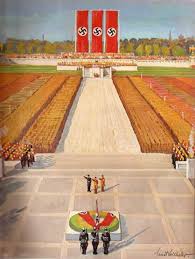I've been reading Germany 1945 by Richard Bessel, a professor of Modern History at York University. Bessel, like Richard Evans (who wrote the amazing trilogy on the Third Reich), is a tirelessly thorough historiographer who zeroes in on one discrete point in time, the year the war ended in Germany, and tells you everything that happened in that awful place. It's not too much to say that blood ran in the streets. Germany was a slaughterhouse of its own making, and if it was the intent of the Allies, as Churchill said, to bring the war home to the German people, they succeeded beyond their wildest imagination. What's remarkable is that the German Wehrmacht suffered about 1/4th of its total deaths in the period between January 1, 1945 (when the last German offensive, the Battle of the Bulge, failed) and the cease-fire in early May. The Germans lost more than one million men during these 4-1/2 months, most of them on the Eastern Front as the Soviets brought the full force of their armies to bear in a rush toward Berlin. The Germans lost more men in January, 1945 (450,000) than did the United States during the entire course of the war (the same statistic is true for the British).
It was the crazed fanaticism of Hitler and his High Command, sealed up in their bunker, that caused all this senseless, horrible slaughter, as German civilians rushed West in an attempt to escape the wrath of the feared Russians, as bombs from the British and Americans rained down from above (in skies no longer protected by the Luftwaffe or anti-aircraft guns), and as the destroyed German infrastructure took its toll in starvation and disease during a very cold winter. The SS and Gestapo enforced the Fuhrer's dictates, hanging and shooting German deserters and stragglers, and also pressing old men and young boys into the Volkssturm to defend German cities in a completely lost cause.
While all this was going on, the German SS was about its usual murder and mayhem, forcing concentration camp survivors on long death marches away from the front, in the bitter cold without food or shelter, killing many or most of them in pointless relocations. The roads were jammed throughout the country with desperate refugees, starving prisoners, panicked soldiers, and as communications were destroyed and the leadership disappeared, Germany descended into complete anarchy. It was utter hell on Earth.
I think about things like that when I read the slightly giddy anticipation of "civil war" in columns such as that written by James Howard Kunstler Monday on his Clusterf**k Nation website. He thinks that dispossessed Americans, accustomed to their suburban comforts, easy access to gasoline, cable TV, et cetera, will engage in open rebellion and violence when it becomes apparent these things are going away and will not be coming back. All I can say is: I sure hope not. I think that's one of the values of reading history - if we think, for one minute, that a Germany 1945 scenario is something devoutly to be wished, that it would "shake things up" in some sort of good way, then we really have lost our minds. I don't think it's a good thing to romanticize, and it's irresponsible even to egg on. I realize that such over-the-top predictions draw hits to the website, but...you know, do your realize what we're actually talking about here?
One thing that might save us, in a paradoxical way, is the innate passivity of the general populace. We'll always have isolated incidents of acting-out, and occasionally (as with the Rodney King riots and the Watts riots of the Civil Rights era) even full-fledged conflagrations based upon perceived injustice and long-nurtured resentment. But why would the general populace resort to violence in a coordinated or even factional way, when the populace will not even use the electoral powers it already possesses to change anything it wants? A recent Rasmussen poll demonstrated that 79% of the American citizenry does not believe that Congress does its work with the interests of the American people as its foremost priority. To begin with, that's pretty astute, I think. But what's remarkable is that Americans will not take the next logical step and simply vote out everybody in office, and break, once and for all, the connections between incumbents and their corporate paymasters (the "535 Plan"). Vote for anyone, your sister-in-law, the guy behind the deli counter, your favorite barista, but just put in all new people, of whatever party, and start the hell over. Never happens, never going to happen, and probably the main reason is the fundamental atomization of the American Volk. There is no means of general organization, other than the central government itself, and everyone watches this government we supposedly despise for cues on what to do next.
So Americans are mired in disgust, and some people (the Austin suicide pilot, e.g.) take it to the next level. But mostly we just complain, watch TV and surf the Net. About 20% of the work force is underemployed. That's a huge cohort of dissatisfied people. Yet nothing much happens.
Maybe we're too civilized, maybe we're too apathetic, maybe we just don't know what to do. Kunstler and the Apocalypto-Freaks revel in the fantasy we can have our very own Third Reich. Sure hope not. Sure hope we come through all this intact.



No comments:
Post a Comment